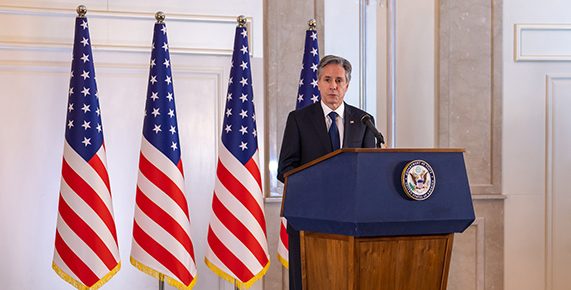On Wednesday, Biden held a phone call with Netanyahu where he “stressed the urgency of bringing the ceasefire and hostage release deal to closure.” The U.S. president also “discussed upcoming talks in Cairo to remove any remaining obstacles.”
U.S. Secretary of State Antony Blinken’s remarks over Israeli Prime Minister Benjamin Netanyahu’s acceptance of the latest bridging proposal has “effectively sabotaged the deal”, according to Israeli news outlet Yedioth Ahronoth.
Citing “negotiation insiders” on Wednesday, the newspaper reported that Blinken’s comments from his visit to Tel Aviv on Monday over Netanyahu’s “confirmed” support for the proposal were “a severe misstep” and “a serious foul.”
Insiders told Yedioth Ahronoth that Blinken’s statement showed “naiveté, amateurishness, and a lack of understanding” while leaning towards Netanyahu’s position, which insists on maintaining Israeli presence in the Philadelphi Corridor. This is a key sticking point in the negotiations.
The insiders also said the optimistic remarks were “politically motivated” and aimed at ensuring “a smooth Democratic convention in Chicago”, which ends on Thursday.
The discussions have been centred around a bridging proposal presented during the latest round of negotiations in Doha, held between August 15-16.
The talks aimed at bridging gaps between Israel and Hamas following a prolonged stalemate by building on a proposal made by U.S. President Joe Biden on May 31.
However, the Israeli report said the American proposal is vague and lacks details regarding the Philadelphi Corridor and the Egypt-Gaza Rafah Crossing, which Israel has occupied since May 6.
Hamas had said earlier this week that Netanyahu has been rejecting a comprehensive withdrawal from the Gaza Strip while insisting on occupying the Netzarim corridor, the Egypt-Gaza Rafah Crossing and the Philadelphi Corridor.
The Netzarim Corridor enables Israeli occupation forces to carry out deadly raids in northern and central Gaza while preventing displaced Palestinians’ from returning to the north.
The issue has long been among the sticking points of the negotiations, with Israel repeatedly placing conditions on the return of internally displaced Palestinians to northern Gaza.
Israel had also invaded and destroyed the vital Rafah Crossing on May 6, moments after Hamas agreed to a deal presented by the mediators. The occupation of the crossing disrupted the flow of aid and life-saving evacuations of Palestinians in need of medical treatment abroad.
The Philadelphi Corridor was initially a buffer zone under the Egypt-Israel 1979 treaty that ended the Israeli occupation of Egypt’s Sinai Peninsula.
Blinken had embarked on his ninth regional trip since the beginning of Israel’s war in the Gaza Strip on October 7, 2023, where it has since killed at least 40,223 people.
The latest regional visit started on August 17 in Tel Aviv, followed by Cairo and wrapped up in Doha on Tuesday without a sign of a breakthrough.
Talks to continue in Cairo
Meanwhile, on Wednesday, Biden held a phone call with Netanyahu where the former “stressed the urgency of bringing the ceasefire and hostage release deal to closure.” The U.S. president also “discussed upcoming talks in Cairo to remove any remaining obstacles.”
The Biden administration has been keen on concluding a deal soon in what has been widely seen as an attempt to seek a pre-election win while attempting to avert further escalations in the region.
Regional tensions have soared since Israel’s assassination of Hamas political chief Ismail Haniyeh in Tehran on July 31 and the Israeli assassination of Hezbollah commander Fouad Shukur in Beirut on July 30.
While Israel claimed the attack in Beirut, it has yet to claim responsibility for the killing of Haniyeh despite global condemnations, including from mediators Qatar and Egypt.
Iran and Hezbollah, which is part of the ‘Axis of Resistance’, have since vowed to retaliate against Israel.
A new round of negotiations is scheduled to take place in Cairo this week, though Egyptian officials told the Associated Press (AP) on Thursday that Hamas will not agree to the proposal mainly due to Israel’s refusal to fully withdraw from the Gaza Strip and end the war.
“The Americans are offering promises, not guarantees,” an official told AP.
“Hamas won’t accept this, because it virtually means Hamas will release the civilian hostages in return for a six-week pause of fighting with no guarantees for a negotiated permanent cease-fire,” they added.
In remarks to ABC News on Tuesday, Qatar’s foreign ministry spokesperson Majed Al Ansari said the negotiations remain the only way to a resolution while maintaining optimism over the talks.
“More difficult partners in peace have been on such tables in the past and signed such agreements…it is not an easy mediation to go through, it’s not an easy discussion and it’s not an easy…pathway towards peace,” he said.







